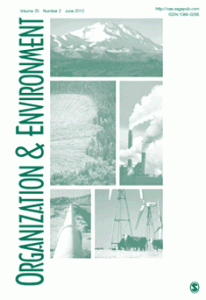Organization & Environment Turns a New Leaf
Organization & Environment invites you to submit articles, essays, reviews and more for a “re-booted” issue on Sustainability and Organizations: Where We’ve Been and Where We’re Going.
Sustainability opportunities and challenges appear to be increasing in frequency and intensity in this second decade of the 21st Century. Advancing the capability of individual, organizational, and societal efforts to achieve and maintain long-term quality of life values (our short-hand definition of sustainability), such as addressing global climate disruption, ever-increasing population and  economic activity, massive extinctions of biodiversity-critical species and toxification of nearly two-thirds of the planet’s ecosystems, and the crushing scourges of poverty, enslavement, and exploitation, all present sustainability scholars (and practitioners) with positive chances for a better world and negative threats of “sustain-ocide”.
economic activity, massive extinctions of biodiversity-critical species and toxification of nearly two-thirds of the planet’s ecosystems, and the crushing scourges of poverty, enslavement, and exploitation, all present sustainability scholars (and practitioners) with positive chances for a better world and negative threats of “sustain-ocide”.
As Organization & Environment reorganizes itself to help sustainability researchers better address these environmental and socio-economic opportunities and challenges, the incoming O&E co-editors thought that a thorough assessment of our past and present collective sustainability milieu and suggestions on how we can best address these in our scholarship (and, perhaps, even in our practice) would be an appropriate theme for our first “re-oriented” issue.
To this end, we are encouraging all sustainability management, policy, and related social science researchers to develop and submit articles, essays, reviews, and other intellectual efforts to focus on where we have been (our individual/organizational/societal past and present research efforts to improve on that condition) and we are going and suggested ways forward in the future, both conceptually and practically. Our main intent is to explore the connections between the management of organizations and any of the dimensions of sustainability.
Some of the questions we are asking contributors to consider, whether through our double-blind peer review process or our co-editor invitations include (but are not limited to):
- How have researchers in sustainability helped advance sustainability at one or more levels of human organization?
- What have been the observed or hypothesized impacts of environmental and/or socio-economic sustainability research on those studied phenomena (that is, does it look like our research has made a difference so far)?
- Which sustainability issues have not been adequately addressed by sustainability researchers in the past, why do these gaps exist, and how can these issues be addressed in future sustainability research?
- Which sustainability issue or issues (environmental and/or socio-economic) will become significantly more salient in the decade(s) immediately ahead, and how should sustainability researchers approach these for maximum impact?
- Since most of us have either family members or friends who are in one or more “future generations”, how can and should these personal connections to the future influence our research to help contribute to their welfare long after we move to the next stages of our careers and lives?
- How can we collaborate with colleagues in related sustainability fields to join us in researching salient sustainability issues, providing broader (and perhaps deeper and more effective) perspectives on how sustainability opportunities and challenges can be be approached jointly? Particularly, how can multiple social sciences collaborate /have collaborated with the analysis of sustainability management in organizations?
- How might technology, whether classified as hardware, software, or “warmware”, be used by either us or by others in society (such as practitioners and our other stakeholders) to leverage sustainability opportunities and tackle sustainability challenges with positive sustainability results?
- Whatever your current level and status in sustainability academia, what kind of sustainability legacy would you like to eventually develop that you think would be seen as having a positive sustainability impact?
- How can social and environmental sustainability management phenomena be integrated for “total” or “holistic” sustainability approaches, whether through integrated sustainability indicators, approaches, policies, values, strategies, programs, or results?
- Speaking of integration of sustainability phenomena, how can academic and practitioner sustainability management efforts and achievements be better connected to one another in the future, perhaps learning from the “non-successes” of these efforts in the past?
- What are the antecedents and outcomes of organizational and inter-organizational sustainability capability generation at regional, national, and global levels?
- What academic theories have contributed to practical sustainability results, are new sustainability theories needed if these results have not been sufficient, and how might academics best communicate these theories and their actual or potential impacts to their multiple sustainability-oriented stakeholders for maximum impact toward sustainability solutions?
These and many other related past, present, and future sustainability phenomena are appropriate and welcomed for this “re-booted” O&E journal issue. We encourage sustainability scholars from multiple disciplines to contact either of the co-editors about their “sustainability-in-transition” ideas and to think, feel, and write “outside the box”. In addition, please also feel free to consult with the co-editors to discuss how their potential submissions can help redirect and take the journal to the next level of quality and impact.
For paper submission, authors will be required to set up an online account on the SAGETrack system hosted by ScholarOne. All manuscripts should be submitted via http://mc.manuscriptcentral.com/oe.
Your suggestions for future issues are also welcomed, so please contact either Mark Starik (mark.starik@gmail.com) or Alberto Aragon-Correa (jaragon@ugr.es) to develop new, interesting, and impactful ideas for this and future O&E issues. A new O&E Editorial Board will be forming with the goal of increasing the quality and readership of the journal by becoming both more rigorous and relevant in addressing the sustainability issues of our time.
Let’s make future generations of sustainability scholars proud of our achievements and our efforts to provide the foundations for truly sustainable human organizations, including the individuals within them and the societies of which they are key elements!
To learn more about Organization & Environment, please click here.
































































































